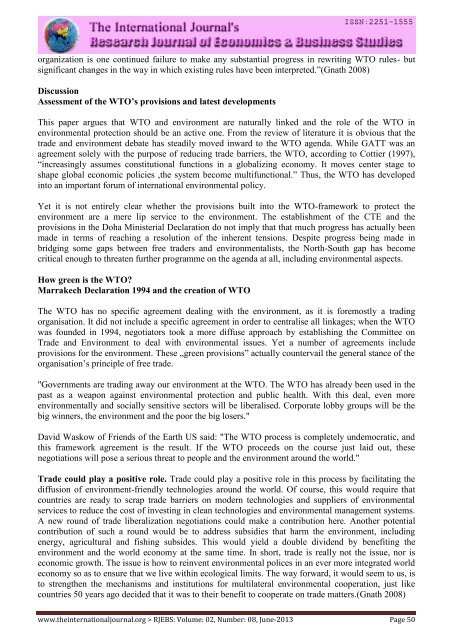Research Journal of Economics & Business Studies - RJEBS - The ...
Research Journal of Economics & Business Studies - RJEBS - The ...
Research Journal of Economics & Business Studies - RJEBS - The ...
- No tags were found...
You also want an ePaper? Increase the reach of your titles
YUMPU automatically turns print PDFs into web optimized ePapers that Google loves.
organization is one continued failure to make any substantial progress in rewriting WTO rules- but<br />
significant changes in the way in which existing rules have been interpreted.”(Gnath 2008)<br />
Discussion<br />
Assessment <strong>of</strong> the WTO’s provisions and latest developments<br />
This paper argues that WTO and environment are naturally linked and the role <strong>of</strong> the WTO in<br />
environmental protection should be an active one. From the review <strong>of</strong> literature it is obvious that the<br />
trade and environment debate has steadily moved inward to the WTO agenda. While GATT was an<br />
agreement solely with the purpose <strong>of</strong> reducing trade barriers, the WTO, according to Cottier (1997),<br />
“increasingly assumes constitutional functions in a globalizing economy. It moves center stage to<br />
shape global economic policies ,the system become multifunctional.” Thus, the WTO has developed<br />
into an important forum <strong>of</strong> international environmental policy.<br />
Yet it is not entirely clear whether the provisions built into the WTO-framework to protect the<br />
environment are a mere lip service to the environment. <strong>The</strong> establishment <strong>of</strong> the CTE and the<br />
provisions in the Doha Ministerial Declaration do not imply that that much progress has actually been<br />
made in terms <strong>of</strong> reaching a resolution <strong>of</strong> the inherent tensions. Despite progress being made in<br />
bridging some gaps between free traders and environmentalists, the North-South gap has become<br />
critical enough to threaten further programme on the agenda at all, including environmental aspects.<br />
How green is the WTO?<br />
Marrakech Declaration 1994 and the creation <strong>of</strong> WTO<br />
<strong>The</strong> WTO has no specific agreement dealing with the environment, as it is foremostly a trading<br />
organisation. It did not include a specific agreement in order to centralise all linkages; when the WTO<br />
was founded in 1994, negotiators took a more diffuse approach by establishing the Committee on<br />
Trade and Environment to deal with environmental issues. Yet a number <strong>of</strong> agreements include<br />
provisions for the environment. <strong>The</strong>se „green provisions” actually countervail the general stance <strong>of</strong> the<br />
organisation’s principle <strong>of</strong> free trade.<br />
"Governments are trading away our environment at the WTO. <strong>The</strong> WTO has already been used in the<br />
past as a weapon against environmental protection and public health. With this deal, even more<br />
environmentally and socially sensitive sectors will be liberalised. Corporate lobby groups will be the<br />
big winners, the environment and the poor the big losers."<br />
David Waskow <strong>of</strong> Friends <strong>of</strong> the Earth US said: "<strong>The</strong> WTO process is completely undemocratic, and<br />
this framework agreement is the result. If the WTO proceeds on the course just laid out, these<br />
negotiations will pose a serious threat to people and the environment around the world."<br />
Trade could play a positive role. Trade could play a positive role in this process by facilitating the<br />
diffusion <strong>of</strong> environment-friendly technologies around the world. Of course, this would require that<br />
countries are ready to scrap trade barriers on modern technologies and suppliers <strong>of</strong> environmental<br />
services to reduce the cost <strong>of</strong> investing in clean technologies and environmental management systems.<br />
A new round <strong>of</strong> trade liberalization negotiations could make a contribution here. Another potential<br />
contribution <strong>of</strong> such a round would be to address subsidies that harm the environment, including<br />
energy, agricultural and fishing subsides. This would yield a double dividend by benefiting the<br />
environment and the world economy at the same time. In short, trade is really not the issue, nor is<br />
economic growth. <strong>The</strong> issue is how to reinvent environmental polices in an ever more integrated world<br />
economy so as to ensure that we live within ecological limits. <strong>The</strong> way forward, it would seem to us, is<br />
to strengthen the mechanisms and institutions for multilateral environmental cooperation, just like<br />
countries 50 years ago decided that it was to their benefit to cooperate on trade matters.(Gnath 2008)<br />
www.theinternationaljournal.org > <strong>RJEBS</strong>: Volume: 02, Number: 08, June-2013 Page 50

















